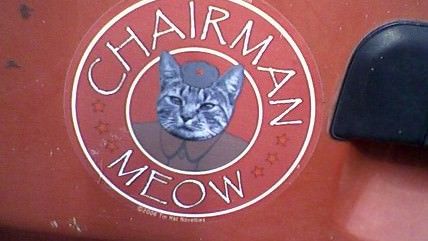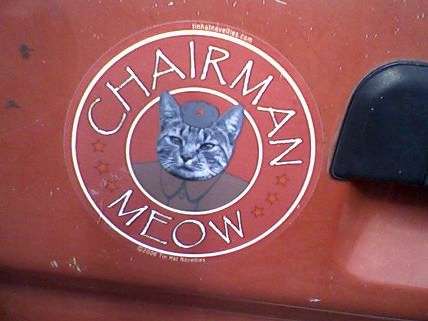Thomas Friedman's Favorite Dictatorship Bans Puns

Thomas Friedman, wealthy dispensor of statist conventional wisdom, once ruminated on Meet the Press that he has "fantasized" about how much better off the United States would be if it briefly ditched representative democracy for China's authoritarianism:
What if we could just be China for a day? I mean, just, just, just one day. You know, I mean, where we could actually, you know, authorize the right solutions, and I do think there is a sense of that, on, on everything from the economy to environment. I don't want to be China for a second, OK, I want my democracy to work with the same authority, focus and stick-to-itiveness.
The "authority, focus and stick-to-itiveness" of the People's Republic of China also includes crackdowns on dissidents, the destruction of homes standing in the way of Olympic stadium progress, and now, forbidding the scourge of puns.

As reported by The Wall Street Journal, China's State Administration of Press, Publication, Radio, Film and Television (SAPPRFT) has outlawed puns and wordplay in advertising and broadcasts because they are "contradictory in spirit to the promotion and continuance of excellent, traditional Chinese culture." The Journal also reports:
As part of an antipun rationale, authorities also cited the need to improve China's soft power abroad. Building soft power, the regulator said, required creating more cultural awareness and confidence.
"Confident Culturally Aware Soft Power" sounds like a possible title for a future Friedman column, but China's one-party communist government extends its soft power much further than outlawing attention-grabbing fun with language. According to Business Insider, China has banned hundreds of words and phrases. Here are some highlights:
"Victoria" (Weiduoliha)
In Roman mythology, Victoria was the goddess of victory. So does Weibo block the name because of that? The lingerie models? No, it's blocked for Hong Kong's Victoria Park.
Every June 4, Victoria Park acts as the site for a candlelight vigil commemorating those who died in Tiananmen Square in 1989. Other demonstrations frequently use the park as a home base, too.
"May 35" (Wuyue sanshiwu)
Since May has 31 days, the date "May 35" would technically be June 4 — the day the army arrived in Tiananmen Square in Beijing in 1989 to deal with demonstrators.
Since June 4 is obviously blocked on Weibo, users found other ways to discuss the date: "day four," "the beginning of June," and even phonetic translations of the words "six" and "four." All of them have been, or still are, blocked.
"Meow" (mimi)
Known to Westerns as the sound a cat makes (or an oboe-like folk instrument), "meow" in Chinese is roughly the equivalent to "tits" in English.
The banned phrases span from subtle political protest to silly sexual innuendos to words like "wifi," which the Chinese government views as a creeping Western threat to the aforementioned "soft power."
Headline writers have had a blast wielding "the lowest form of humor" while reporting on the pun ban and comparisons to the fictional government and its "Newspeak" language depicted in George Orwell's 1984 are obvious. But for big idea-thinkers like Friedman, this latest Chinese action serves as a helpful reminder that Big Brother also never lacked for "stick-to-itiveness."
Reason is your voice in debates about politics, culture, and ideas. Our annual Webathon is underway and your tax-deductible gift will help us fight against big government, crony capitalism, the drug war, and so much more. For details on giving levels and swag, go here now.


Show Comments (91)